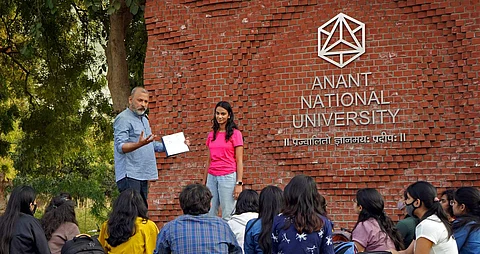

Ahmedabad's Anant National University (ANU) has claimed that it has launched India’s first undergraduate degree focusing on climate action. The Bachelor of Technology degree specialising in Climate Technologies is a four-year engineering degree. The private university claims that it is a super-specialisation in climate technologies. At present, IISc Bengaluru offers MTech and PhD programmes in Climate Sciences. TERI, in New Delhi, offers a Master’s degree in Climate Science and Policy. IIT Mumbai, as well, runs an interdisciplinary programme in Climate Studies only at the doctoral level. IIT Hyderabad offers a few courses and electives related to climate change.
ANU makes a promise of teaching aspiring engineers the use of engineering tools and design thinking principles to create technology-driven solutions for climate change. The on-campus climate lab will be equipped with the latest software to run climate simulations and various instruments and technical apparatus for weather measurements, solar radiations, studying and simulating PV systems, testing and set up of renewable energy sources.
The degree aims to prepare students for positions in industries that need to mitigate climate impact and for roles that require climate modelling, near-term climate analysis and predictions, positions in government agencies serving to make policy and independent laboratories conducting climate research. While the International Finance Corporation predicts $23 trillion in climate industry opportunities globally, 3 million in renewable energy jobs in India and $2.5 trillion opportunities in climate-resilient infrastructure in India and Bangladesh by 2030, there is a gaping lack of technically skilled people qualified for these jobs.
Prime Minister Narendra Modi pledges that India will move to net zero emissions by 2070 but this can only happen if people are skilled enough to work within industries and move them to net zero. The climate industry is booming and set to grow exponentially in the coming decades but there are hardly any people qualified for these new jobs. Commenting on the launch of the programme, Dr Anunaya Chaubey, Provost, ANU, said, “The reasons and implications of climate change in India and certain other emerging nations differ from those in the rest of the world. Thus, there is a need for specialised climate studies programmes that give regional context. It is important to train students to find and implement solutions, and develop technology to adapt to and mitigate climate change for India as well as other parts of the world.”
“Measuring, predicting, mitigating and adapting to climate change needs an influx of new technologies, as well as millions of people skilled in the use of existing and new ones. We are glad to establish India’s first undergraduate degree related to climate as this will effectively move our country and the world closer to the goal of zero-emission. I invite students to become engineers who solve for climate change, and request parents to support the students in their unique choice of this job-oriented and specialised engineering degree offered by AnantU.” said Dr Miniya Chatterji, Founding Director, Anant School for Climate Action, and CEO, Sustain Labs Paris.
ANU claims that the degree curriculum is designed in a way that every semester (total 6) offers an incremental step across 8 climate technology streams — climate simulation, engineering mathematics, environmental engineering, climate chemistry, energy and technology, design thinking and behavioural science, technology and society — as well as applied research projects in the Climate Lab.
The final 2 semesters focus on specialisation and full industry immersion such that students will be placed within the climate industry, co-guided by an academic guide and industry expert. ANU also has its own incubation centre, Aarambh, to encourage entrepreneurial ventures. ANU receives more than 5,000 applications from over 50 countries for 20 seats each year.
